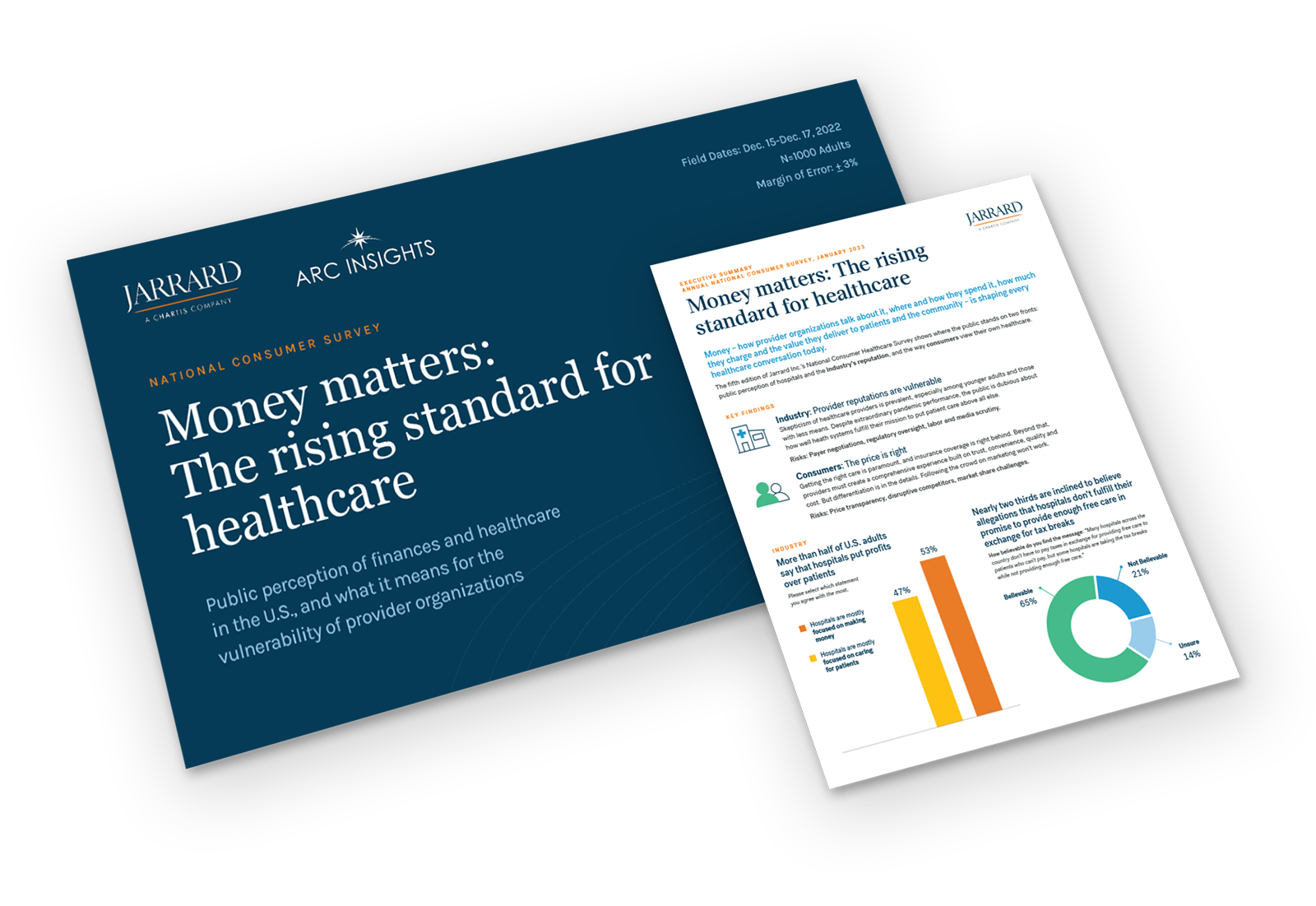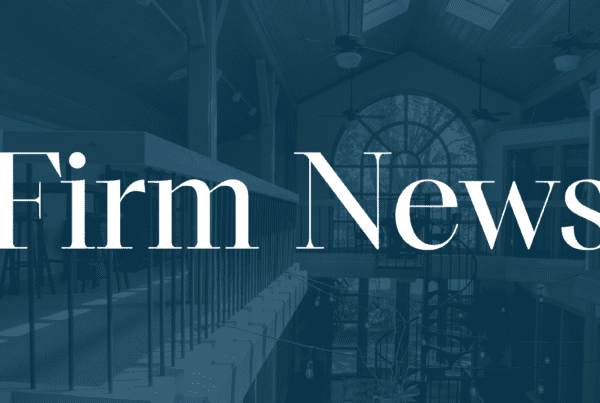New data confirms vulnerability of hospital reputations; report suggests ways to better connect with healthcare consumers
BRENTWOOD, Tenn., and Chicago – Over half say that U.S. hospitals are focused more on making money than caring for patients, while nearly one third of U.S. adults have delayed seeking medical care due to financial concerns, according to a new survey from national healthcare strategic communications consultancy Jarrard Inc. and research firm Arc Insights.
The survey is the fifth in a series started in April 2020 to delve into the public’s trust in American healthcare providers in the face of the rising COVID-19 pandemic. The current edition shows that economic and financial issues are not only the top concerns facing the country, but also the lens through which the public skeptically views the healthcare industry today.
Notably, the survey of 1,000 adults across the U.S. found that barely half of people give even their preferred hospital high marks when it comes to handling financial issues, such as financial assistance and putting patient needs above pressure to make money.
The findings fall into two key themes and reveal the need for U.S hospitals, health systems and health services companies to bolster their communications and change management efforts, while being proactive with price transparency and strengthening payer relations.
Healthcare Industry
Public perception of the industry is underwater. Only 41 percent say that healthcare in the U.S. equitable, down four points from a year ago. Only 39 percent say U.S. healthcare offers good value for the cost. And a majority – 53 percent – agree more with the statement that “Hospitals are mostly focused on money” than they do with the statement that “Hospitals are mostly focused on caring for patients.”
Over the past couple of years, media criticism of non-profit hospitals’ approach to finances has increased, with reporters and activists questioning whether hospitals provide sufficient charity care to warrant their tax-exempt status. Two-thirds of Jarrard Inc. survey respondents found these allegations believable, whether or not they had seen such stories.
“Today’s economic uncertainty, combined with a years-long decline in trust in institutions, has created a foundation for skepticism among the public when it comes to provider organizations – historically some of society’s most cherished institutions,” said David Jarrard, chairman of the Jarrard Inc. Executive Committee. “The skepticism is expressed in a willingness to believe the worst about hospitals and doubt over their commitment to fulfilling their mission to care equitably for all.”
Local Hospitals and Consumer Preferences
While viewed more favorably than the industry as a whole, local provider organizations are still on shaky ground with their patients. The survey shows that people have somewhat more positive perceptions of their preferred hospital than they do provider organizations in general. Yet, only 49 percent of U.S. adults feel strongly that their preferred hospital does a good job when it comes to issues of patient finance-related issues such as cost of care, billing and financial assistance.
Jarrard advised that hospitals invest in that base of positivity, further reinforcing it and developing trust and relationships with their patients.
“It’s critical that healthcare leaders talk more openly and clearly about money, as uncomfortable as those conversations may be,” he said. “From the board to front-line patient registration, hospitals need to be transparent and lead the discussion about healthcare finances at all levels, engaging patients, community leaders and policymakers. That transparency is necessary to help the public better understand the realities facing hospitals and how it affects them as patients.”
When it comes to seeking care, the survey results show that people place quality and insurance coverage above all other factors. Below that, however, patients prioritize being listened to, feeling cared for and being able to get an appointment in a reasonable time.
“When we look at consumer preferences in seeking care, we see a desire for relationship and trust,” said Jarrard. “Providers have always led on the personal nature of healthcare. Unlike other areas of the industry, hospitals are the places where patients have one-on-one interactions, where doctors and nurses heal. That strength provides a powerful foundation for provider organizations to further engage with patients and create personal experiences that address individual needs.”
Full survey results can be found here.
About the firms
Jarrard Inc.
With offices in the healthcare hubs of Nashville and Chicago, Jarrard Inc. is a specialized healthcare consulting firm devoted to helping leaders during high-stakes moments of change, challenge and opportunity. The firm uses the power of communications, marketing and political strategy to help clients achieve their most important goals. Jarrard Inc.’s mission is to make healthcare better through its work. Founded in 2006, the firm has worked with more than 1,000 clients in 45+ states and served as a communications advisor on more than $75 billion in announced M&A and partnership transaction communications. The firm focuses on change management, issues and advocacy, and strategic positioning. Jarrard Inc. is a division of Chartis, one of the nation’s leading healthcare advisory firms.
For more information, visit jarrardinc.com or follow on LinkedIn.
Arc Insights is a full-service consulting and research firm that provides opinion insights to clients including companies, non-profits, issue campaigns, and candidates for office. Arc is led by Nicholas Thompson, whose background includes serving as a senior vice president with The Tarrance Group, a political research firm, a member of the White House staff under President George W. Bush, and as an in-house research director for Stand Together, a major non-profit.
Arc is a sister company of Capitol Resources, a government affairs firm with nine offices across the South, and BullsEye, an award-winning public affairs firm.


